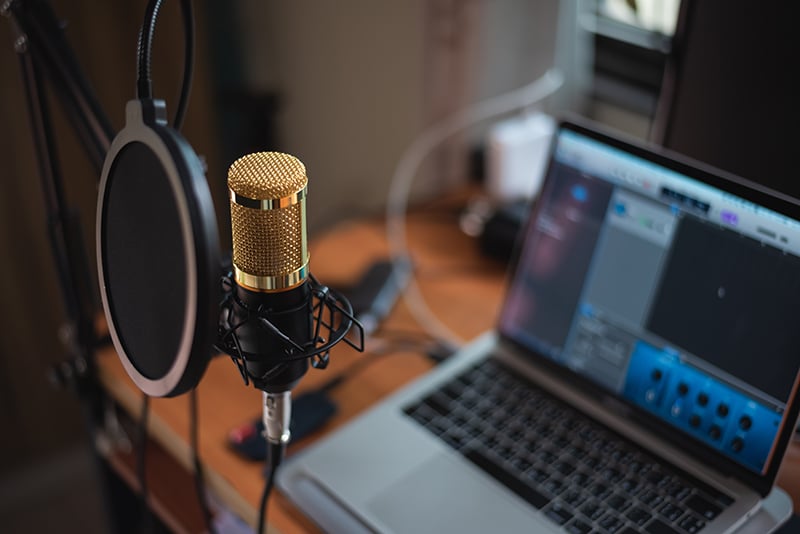Sound was first captured in Paris by Édouard-Léon Scott de Martinville in the late 1850. Alexander Graham Bell’s first telephone call in 1876 and Thomas Edison’s phonograph in 1877 were the next milestones in sound recording. Later systems used magnetic tape to recorded audio material. With the advent of modern digital equipment in the 1990s, it became possible for audio recordings to be transcribed. Today, audio transcription services are available to transform recordings of work meetings, lectures, discussions, interviews, podcasts, and more into accurate transcripts. Using a quality voice recorder is essential to record conversations correctly.
Common Types of Voice Recorders
A voice recorder can capture important interactions, making it an important tool for business professionals, academicians, students, lawyers, and others. Top digital voice recording devices come with extended storage which enables them collect voice recordings over months. There are different types of voice recorders and most modern devices are digital.
- Portable digital recorders: These small, light handheld devices can be used make recordings independently from your mobile device or system. They can be mounted or connected to other equipment to record audio from external sources. A portable digital recorder is ideal for on-the-go or handheld recording of sounds effects, live shows, music, rehearsals, interviews, lectures, conversations, and much more. Popular digital voice recorders include EVISTR Digital Voice Recorder, Aomago’s Digital Voice Recorder, Sony ICD-PX370 Mono Digital Voice Recorder, Vandlion Voice Activated Recorder and Olympus Voice Recorder.
- Voice recorder software: Recording software allows you to record sound quickly and easily, and is ideal for podcasts and conducting interviews for a research project. Audio files can be uploaded onto servers or implanted into blog content. The software comes with automated features and social sharing options. Top voice recording software options include Audacity, Cleanfeed, Anchor and Sony ACID Xpress.
- Voice recorder apps: From basic to full-featured, voice recorder apps for your phone allow recording interviews, meetings, and more. Voice recording apps are a great option when you need to start recording suddenly and all you have is your mobile device. While a phone’s mic may not provide good audio, there are recording apps that allow external mic connections for improved quality. Consider device compatibility to ensure a recording app that your phone can support. Top recording apps come with AI transcription. Evernote, Microsoft OneNote, GoogleKeep and Bear (for Mac) are popular products.
- Mini voice recorders: This bug micro voice device comes with a highly sensitive voice recorder. It will remain undetected when placed strategically to collect sensitive information. Mini voice recorders do not have an LCD screen and usually have only one button and internal memory of about 2GB or 4 GB. Mini voice recorders can be programmed via remote software on a computer or laptop, giving you control over the device. Popular products include Vandlion Voice Activated Recorder, TileRec Slim Voice Activated Recorder and SOTA Mini Voice Activated Audio Recorder.
Things to Consider When Choosing a Voice Recorder
With multiple options available, you need to choose the best device for your needs. Here are the key points to consider before investing in a voice recorder:
- Type of content: The type of recorder you need will depend on the kind content you need to record. If you are a journalist, you need to know if the recorder has a built-in microphone that is important for field reporting and whether it allows you to use an external microphone. Some recorders are specially designed for capturing interview audio effectively and creating transcripts.
- The setting: When choosing a voice recorder, consider things like whether the recording will take place indoors or out, the time of day, the area of the room, the acoustics, and the number of speakers and if they will uses a microphone. Recording a podcast in a home studio will have different needs than if the content is recorded on the go. Choose a digital voice recorder with noise-blocking features if you are recording your podcast while traveling. On the other hand, a voice recorder with streaming capabilities is a better option in a studio. If you are recording at night or in a setting with poor lighting, invest in a recorder with a bright backlit display.
- Format: There are two kinds of audio file formats: compressed and uncompressed. Uncompressed formats like CD Audio, WAV, or AIFF are an exact representation or copy of the recorded audio and are huge. Compressed formats keep the file size relatively small. Quality recorders will capture uncompressed audio. Cheaper recorders will compress all the audio content that is captured, which will reduce the quality of the recording. Audio quality will be also lost when the file is edited and recompressed, affecting the integrity of the final output.
- Transcription requirements: If you are capturing audio content for your needs and transcribing it on your own, the quality of the recording and other features may not be that important. But if you want to send your audio recording to a digital transcription service provider for transcription, audio quality counts a lot. If the audio recording is poor, there are limitations to what even if a skilled and experienced transcriptionist can achieve. Poor audio also takes longer to transcribe and some companies may charge more.
- Memory capacity: Choose a voice recorder with sufficient storage to save all of your voice recordings, regardless of their quality or length. A device with a built-in flash memory will allow for easy transfer of files from a USB.
- Durability: It’s important to choose an audio recorder with built-in and long battery life as its battery determines how long it will last. A smartphone has a shorter battery life than a voice recorder. Check whether the batteries can be removed, are rechargeable, and whether they are easily available. Also, consider the power consumption of the device.
- Cost: A recorder with high audio quality will cost more. However, if you buy a cheap device, costs would be higher in the long run with the need for maintenance and repair. Consider functionality and value for money when buying an audio recorder. Decide what features are necessary and buy a good quality voice recorder that meets those requirements.
To choose the right voice recorder, you should first decide what features are useful for you. If you are recording business meetings, the ability to share files would be important. Journalists conducting interviews on the go should consider battery life and memory. When it comes to documenting the audio content, professional transcription outsourcing companies can do a good job. Investing in a quality recorder will ensure good audio which is important to obtain digital transcription services at affordable rates.
Trust our skilled transcription team to deliver high-quality audio transcripts!
Reach out to us at (800) 670-2809 for a for a personalized quote!




